Gento was a 5th-century Gothic warrior in Eastern Roman service. He was married to a Roman woman from Epirus, and the commander of a unit of Roman troops. In 479, when Theodoric the Great attempted to settle the Ostrogoths in Epirus with the help of his relative Sidimund, Gento and the Eastern Roman general Sabinianus were tasked with preventing it.

Epirus is a geographical and historical region in southeastern Europe, now shared between Greece and Albania. It lies between the Pindus Mountains and the Ionian Sea, stretching from the Bay of Vlorë and the Acroceraunian Mountains in the north to the Ambracian Gulf and the ruined Roman city of Nicopolis in the south. It is currently divided between the region of Epirus in northwestern Greece and the counties of Gjirokastër and Vlorë in southern Albania. The largest city in Epirus is Ioannina, seat of the Greek region of Epirus, with Gjirokastër the largest city in the Albanian part of Epirus.
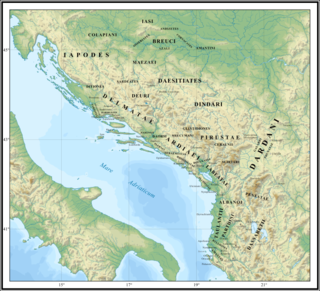
In classical antiquity, Illyria was a region in the western part of the Balkan Peninsula inhabited by numerous tribes of people collectively known as the Illyrians.

Francisco "Paco" Gento López was a Spanish footballer who played as an outside left. A fast runner, Gento was referred to as the "Gale of the Cantabrian Sea" in reference to his speed down the wing. He was voted by IFFHS as the greatest Spanish footballer and 30th greatest world footballer of the 20th century.
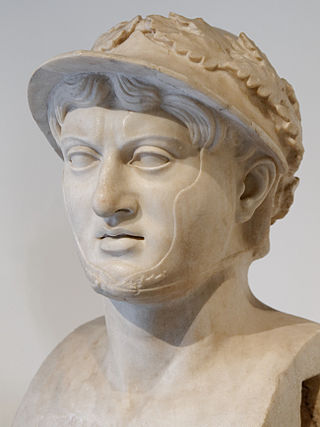
Pyrrhus was a Greek king and statesman of the Hellenistic period. He was king of the Molossians, of the royal Aeacid house, and later he became king of Epirus. He was one of the strongest opponents of early Rome, and had been regarded as one of the greatest generals of antiquity. Several of his victorious battles caused him unacceptably heavy losses, from which the term "Pyrrhic victory" was coined.

Nicopolis or Actia Nicopolis was the capital city of the Roman province of Epirus Vetus. It is located near Preveza, Greece. The city was founded in 29 BC by Octavian in commemoration of his victory in 31 BC over Antony and Cleopatra at the Battle of Actium nearby.

Byzantine Greece has a history that mainly coincides with that of the Byzantine Empire itself.
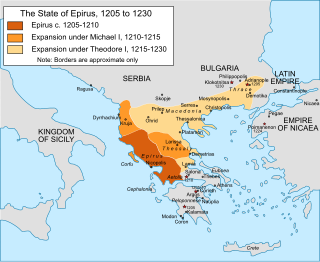
The Despotate of Epirus was one of the Greek successor states of the Byzantine Empire established in the aftermath of the Fourth Crusade in 1204 by a branch of the Angelos dynasty. It claimed to be the legitimate successor of the Byzantine Empire, along with the Empire of Nicaea and the Empire of Trebizond, its rulers briefly proclaiming themselves as Emperors in 1227–1242. The term "Despotate of Epirus" is, like "Byzantine Empire" itself, a modern historiographic convention and not a name in use at the time.
Greece in the Roman era describes the Roman conquest of the territory of the modern nation-state of Greece as well as that of the Greek people and the areas they inhabited and ruled historically. It covers the periods when Greece was dominated first by the Roman Republic and then by the Roman Empire. In the history of Greece, the Roman era began with the Corinthian defeat in the Battle of Corinth in 146 BC. However, before the Achaean War, the Roman Republic had been steadily gaining control of mainland Greece by defeating the Kingdom of Macedon in a series of conflicts known as the Macedonian Wars. The Fourth Macedonian War ended at the Battle of Pydna in 148 BC with the defeat of the Macedonian royal pretender Andriscus.
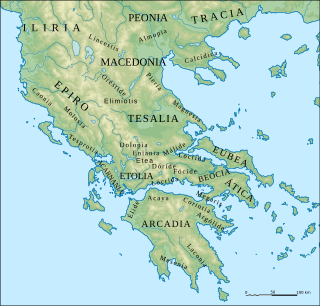
The Molossians were a group of ancient Greek tribes which inhabited the region of Epirus in classical antiquity. Together with the Chaonians and the Thesprotians, they formed the main tribal groupings of the northwestern Greek group. On their northern frontier, they neighbored the Chaonians and on their southern frontier neighbored the kingdom of the Thesprotians. They formed their own state around 370 BC and were part of the League of Epirus. The most famous Molossian ruler was Pyrrhus of Epirus, considered one of the greatest generals of antiquity. The Molossians sided against Rome in the Third Macedonian War and were defeated. Following the war, the region witnessed devastation while a considerable number of Molossians and other Epirotes were enslaved and transported to the Roman Republic, overwhelmingly in Italy itself.
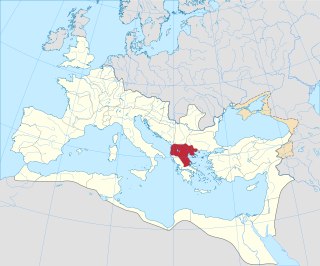
Macedonia was a province of ancient Rome, encompassing the territory of the former Antigonid Kingdom of Macedonia, which had been conquered by the Roman Republic in 168 BC at the conclusion of the Third Macedonian War. The province was created in 146 BC, after the Roman general Quintus Caecilius Metellus defeated Andriscus of Macedon, the last self-styled King of Macedonia in the Fourth Macedonian War. The province incorporated the former Kingdom of Macedonia with the addition of Epirus, Thessaly, and parts of Illyria, Paeonia and Thrace.
Gento may refer to:

Amantia was an ancient city and the main settlement of the Amantes, traditionally located in southern Illyria in classical antiquity. In Hellenistic times the city was either part of Illyria or Epirus. In Roman times it was included within Epirus Nova, in the province of Macedonia. The site has been identified with the village of Ploçë, Vlorë County, Albania. Amantia was designated as an archaeological park on 7 April 2003 by the government of Albania.

Oricum was a harbor on the Illyrian coast that developed in an Ancient Greek polis at the south end of the Bay of Vlorë on the southern Adriatic coast. It was located at the foot of the Akrokeraunian Mountains, the natural border between ancient Epirus and Illyria. Oricum later became an important Roman city between the provinces of Epirus Vetus and Epirus Nova in Macedonia. It is now an archaeological park of Albania, near modern Orikum, Vlorë County. Oricum holds such a strategic geographical position that the area has been in continuous usage as a naval base from antiquity to the present-days.
In 395, the Roman Empire was permanently divided and the area that now constitutes modern Albania became part of the Byzantine Empire.

Epirus was an ancient Greek kingdom, and later republic, located in the geographical region of Epirus, in parts of north-western Greece and southern Albania. Home to the ancient Epirotes, the state was bordered by the Aetolian League to the south, Ancient Thessaly and Ancient Macedonia to the east, and Illyrian tribes to the north. The Greek king Pyrrhus is known to have made Epirus a powerful state in the Greek realm that was comparable to the likes of Ancient Macedonia and Ancient Rome. Pyrrhus' armies also attempted an assault against the state of Ancient Rome during their unsuccessful campaign in what is now modern-day Italy.

The regions of ancient Greece were areas identified by the ancient Greeks as geographical sub-divisions of the Hellenic world. These regions are described in the works of ancient historians and geographers, and in the legends and myths of the ancient Greeks.
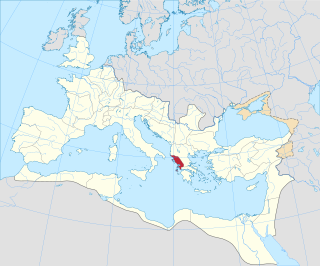
The province of Epirus was a province of the Roman Empire, covering the region of Ancient Epirus. Rome first annexed the region in 167 BC, in the aftermath of the Third Macedonian War, and initially put the region in the larger Roman province of Macedonia, which at the time covered the whole of the Hellenistic world in mainland Europe. In 27 BC, Epirus and Achaea were separated from Macedonia and grouped into the senatorial province of Achaea, with the exception of its northernmost part, which remained part of the province of Macedonia. Under Emperor Trajan, sometime between 103 and 114 AD, Epirus became a separate province, under a procurator Augusti. The new province extended from the Gulf of Aulon (Vlorë) and the Acroceraunian Mountains in the north to the lower course of the Acheloos River in the south, and included the northern Ionian Islands of Corfu, Lefkada, Ithaca, Cephallonia, and Zakynthos.
Sidimund was a 5th-century Ostrogothic warrior. Under the Ostrogothic king Valamir, Sidimund had been plundering Epirus. He was a member of the Amali dynasty and a close relative of Aidoingus, the comes domesticorum. Sidimund later served in the Eastern Roman army with great distinction, and acquired extensive land holdings in the area near Durazzo. He was considered a friend of the Romans and was held in great esteem. In 479, Sidimund helped his relative Theodoric the Great settle in Epirus, despite the opposition of another fellow Goth, Gento.